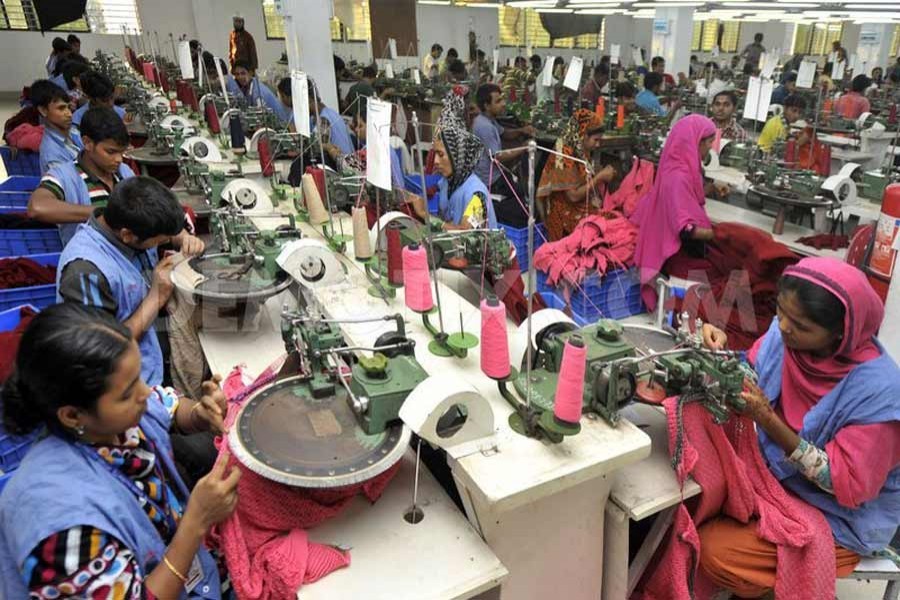A handful of buyers do business simultaneously with more than 300 local readymade garment (RMG) factories, underscoring the industry's major vulnerability, according to a joint-survey.
Zara, H&M, Li & Fung and Walmart are the top four brands out of 3,600 retailers that had business during the last four years with 300 to 352 local RMG factories, showed data of Mapped in Bangladesh (MiB) that tracks export-oriented garment factories digitally.
Experts said the dependence on a small number of buyers is a major weakness not only for small-scale enterprises but also for large factories.
Due to such dependency, exporters had no other option but to accept arbitrary demands such as discounts, deferred payments, and order cancellations during the Covid-19 pandemic.
According to the MiB data, a total of 3,600 global brands, buyers and retailers have been sourcing locally RMG items from 3,211 export-oriented garment factories located in Dhaka, Gazipur, Narayanganj and Chattogram during last four years.
KiK, C&A, Next, LPP, Kmart and Mango are the six brands that have been sourcing from more than 200 local garment factories.
Lidl, Pep & Co, nkd, Matalan, JC Penny, Gap and Target are among the 11 brands that have business with more than 100 factories.
There are 29 brands and retailers that have business with more than 50 but fewer than 100 factories and 175 buyers do business with five to 49 factories while more than 1,300 brands did business with a single factory, the MiB data showed.
According to a latest MiB and Center for Policy Dialogue (CPD) joint study, the majority or 86 per cent of the surveyed 610 factories said that brands/buyers did not take supportive measures for caring about workers' health and financial peril of factories during the pandemic.
It also found the discontinuation of normal business ties with the buyers/brands immediately after the pandemic, which it termed "major challenge" for suppliers.
Small and medium size factories as well as Chattogram-based units were found to be behind in maintaining normal contacts.
Buyers and brands are supposed to maintain normal business contact particularly during the crisis period, discuss the issues and challenges confronted by the suppliers and try to provide predictability to the suppliers with regard to orders, prices and market situation, it said.
About one-third of the factories alleged that at least some of their orders were cancelled and necessary payment was not made.
Some 30 per cent factories reported that a section of buyers deferred shipment with timely payment while 20.5 per cent factories said buyers settled with deferred payment.
About 16 per cent factories claimed that buyers settled part of their orders at a reduced price and 1.8 per cent factories complained that buyers cancelled orders but agreed to pay the cost of raw materials.
The application of 'force majeure' clause in such incidences was widely discussed, the report said, adding a section of buyers/brands reinstated the cancelled orders.
Besides, some buyers filed for bankruptcy, which caused problems for local suppliers.
The report suggested that apparel trade bodies should encourage factories to diversify their buyers' base by including not only large scale buyers/brands but also small-scale buyers/brands.
CPD research director Khondaker Golam Moazzem said the diversified sources, both for suppliers and buyers, help mitigate the challenges emerge during any emergencies.
During the pandemic, for example, a factory's 70 per cent capacity was for a single buyer, he said, explaining that if the factory had a diversified buyers, it could have alternatives when its largest buyer declined to receive or cancel orders.
On the other hand, small buyers are less-affected compared to large ones as the former survived with their one or two stores while the biggies had to close many of their outlets.
Mohammad Abdul Momen, director of the Bangladesh Garment Manufacturers and Exporters Association (BGMEA), said this is nothing uncommon and added that the pre-requisite of becoming vendors of buyers and its process have been becoming stringent day by day.
Citing 90 per cent dependency on a few buyers, he said, the overwhelming reliance of factories on a single or a few buyers is insignificant, considering the size of buyers' requirements as they buy in large volume across the globe.
"Buyers want large capacity," he said, admitting the majority of exports go to 10 to 15 buyers.
When asked, BGMEA president Dr Rubana Huq said buyers' business practices during the pandemic put the industry in uncertainty.
"...uncertainty over confirmed business, shipment, payment and work in progress, allocation of capacity, optimum management of supply chain and the use of resources and economic impact and business viability," she explained.
"We do not want to name and shame any of the buyers, since we have a long history of working relationship with most of the buyers," the BGMEA chief said,
The survival of 4.1 million workers, who are the fuel of the industry, is dependent on responsible sourcing behaviour from brands and retailers, she added.


